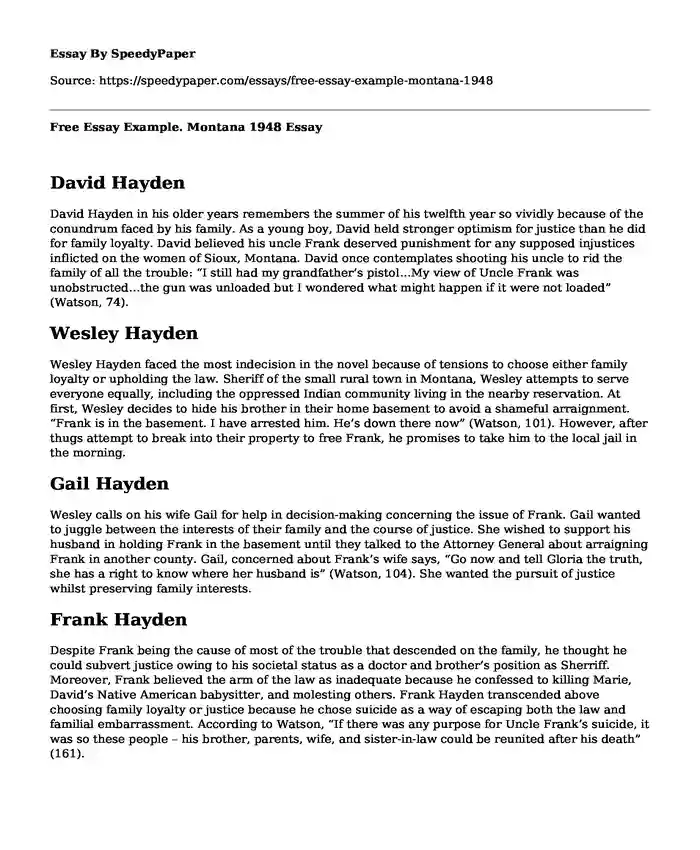
| Essay type: | Book review |
| Categories: | Character analysis Books Writers |
| Pages: | 2 |
| Wordcount: | 518 words |
David Hayden
David Hayden in his older years remembers the summer of his twelfth year so vividly because of the conundrum faced by his family. As a young boy, David held stronger optimism for justice than he did for family loyalty. David believed his uncle Frank deserved punishment for any supposed injustices inflicted on the women of Sioux, Montana. David once contemplates shooting his uncle to rid the family of all the trouble: “I still had my grandfather’s pistol…My view of Uncle Frank was unobstructed…the gun was unloaded but I wondered what might happen if it were not loaded” (Watson, 74).
Wesley Hayden
Wesley Hayden faced the most indecision in the novel because of tensions to choose either family loyalty or upholding the law. Sheriff of the small rural town in Montana, Wesley attempts to serve everyone equally, including the oppressed Indian community living in the nearby reservation. At first, Wesley decides to hide his brother in their home basement to avoid a shameful arraignment. “Frank is in the basement. I have arrested him. He’s down there now” (Watson, 101). However, after thugs attempt to break into their property to free Frank, he promises to take him to the local jail in the morning.
Gail Hayden
Wesley calls on his wife Gail for help in decision-making concerning the issue of Frank. Gail wanted to juggle between the interests of their family and the course of justice. She wished to support his husband in holding Frank in the basement until they talked to the Attorney General about arraigning Frank in another county. Gail, concerned about Frank’s wife says, “Go now and tell Gloria the truth, she has a right to know where her husband is” (Watson, 104). She wanted the pursuit of justice whilst preserving family interests.
Frank Hayden
Despite Frank being the cause of most of the trouble that descended on the family, he thought he could subvert justice owing to his societal status as a doctor and brother’s position as Sherriff. Moreover, Frank believed the arm of the law as inadequate because he confessed to killing Marie, David’s Native American babysitter, and molesting others. Frank Hayden transcended above choosing family loyalty or justice because he chose suicide as a way of escaping both the law and familial embarrassment. According to Watson, “If there was any purpose for Uncle Frank’s suicide, it was so these people – his brother, parents, wife, and sister-in-law could be reunited after his death” (161).
Grandpa Hayden
David Hayden knew his grandfather as a loving family man who kept a pony for him to ride when they visited his farm. However, the realization that his Grandpa was racist and abhorred the Native American community struck David as an adult. Grandpa Hayden revolted against Wesley’s act of arresting Frank and sent men to free the doctor from the basement. Wesley once ordered his son, David, “If Grandpa should come here when I am not home, you are not to let him in” (Watson, 117). Grandpa knew that family loyalty prevailed over justice.
Works Cited
Watson, Larry. Montana 1948: A Novel. Minneapolis, MN: Milkweed Editions. 1993.
Cite this page
Free Essay Example. Montana 1948. (2023, Aug 17). Retrieved from https://speedypaper.com/essays/free-essay-example-montana-1948
Request Removal
If you are the original author of this essay and no longer wish to have it published on the SpeedyPaper website, please click below to request its removal:
- Review Essay Sample on The Iliad
- Book Review Essay Sample on My Sister's Keeper
- Nicolo Machiavelli's The Prince Literature Essay Sample
- Free Essay. Reflection on an Action Research
- Free Essay. My Idea of Perfect Happiness
- Essay Sample on Supportive Psychotherapy Versus Interpersonal Psychotherapy
- Essay on The Earth Trembles: A Cinematic Exploration of Family, Love, and Social Struggles in a Sicilian Fishing Village
Popular categories




